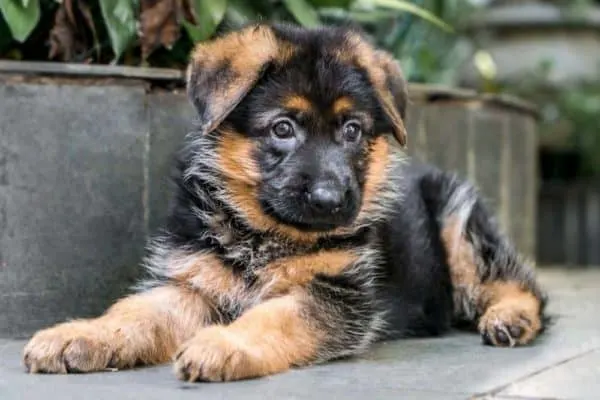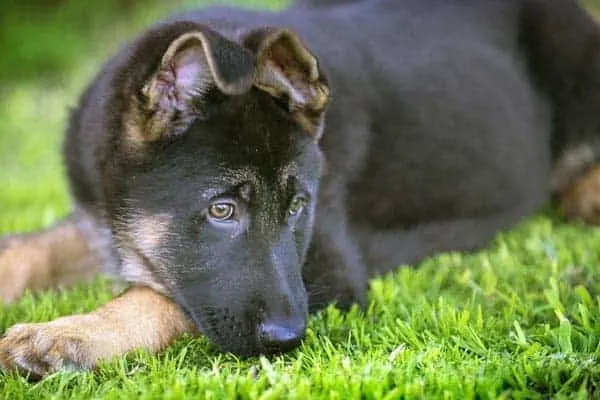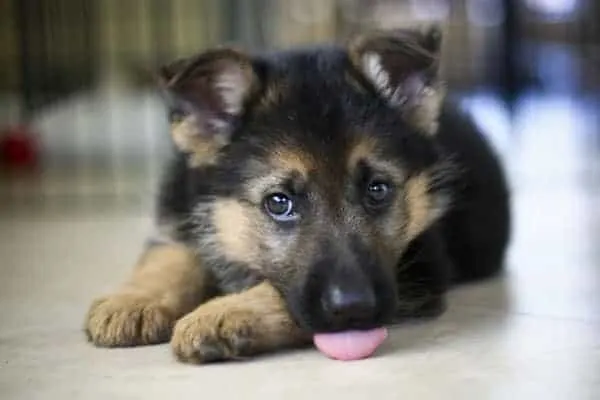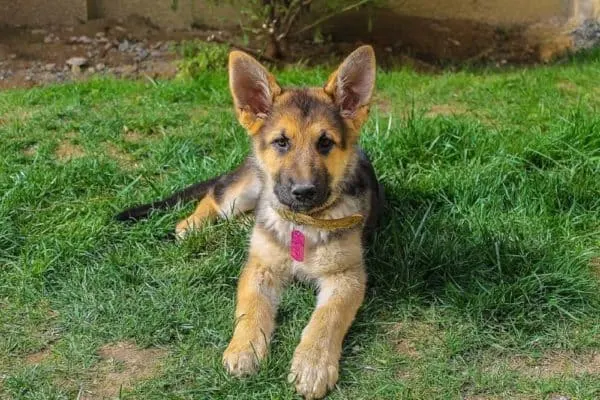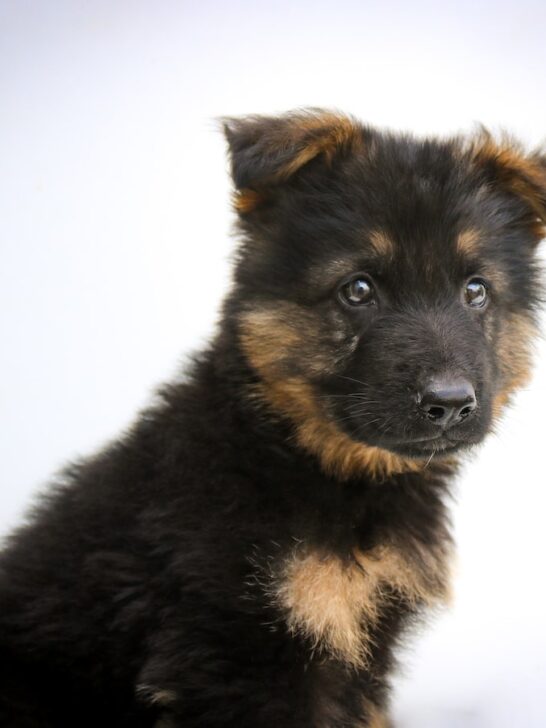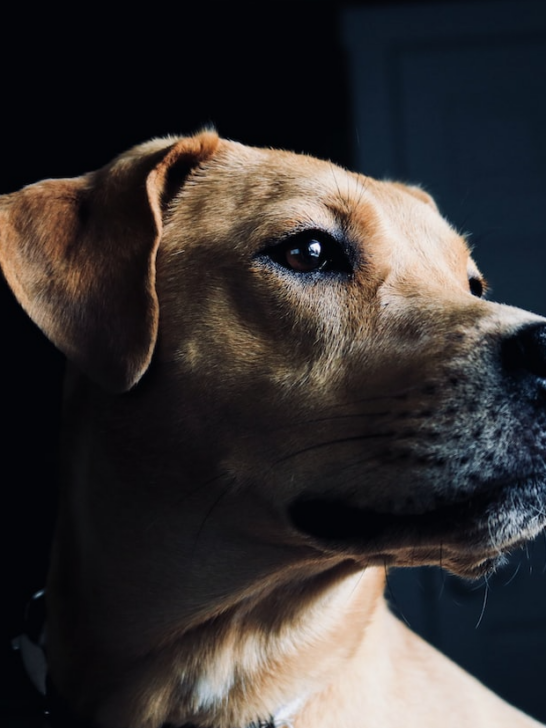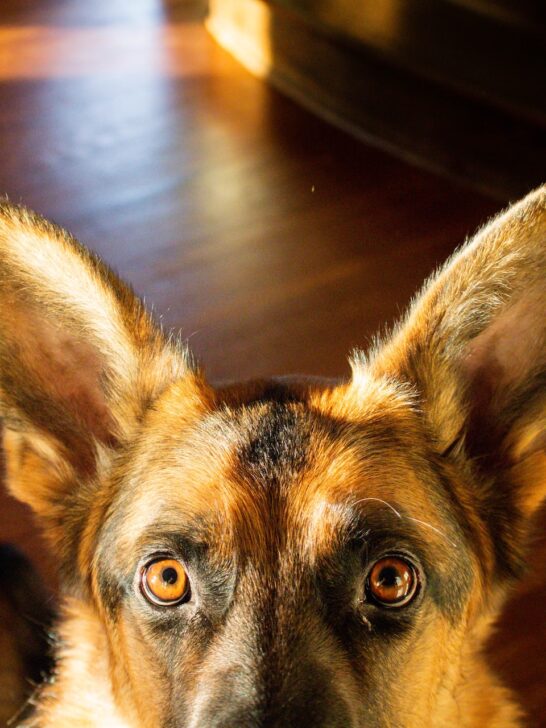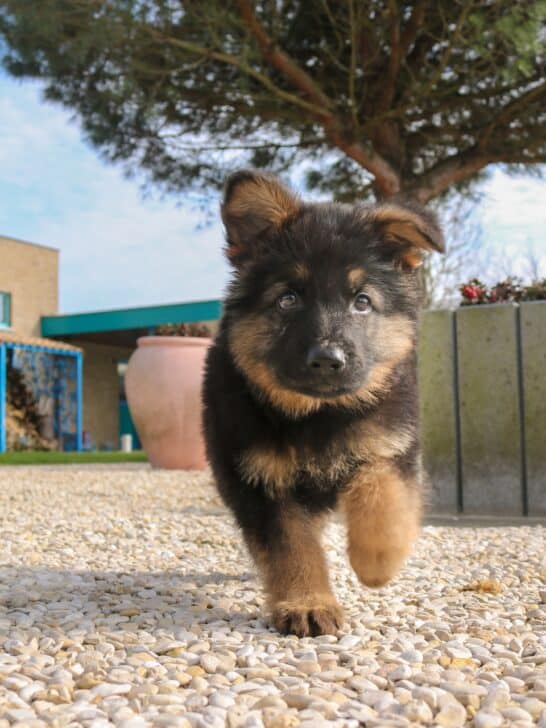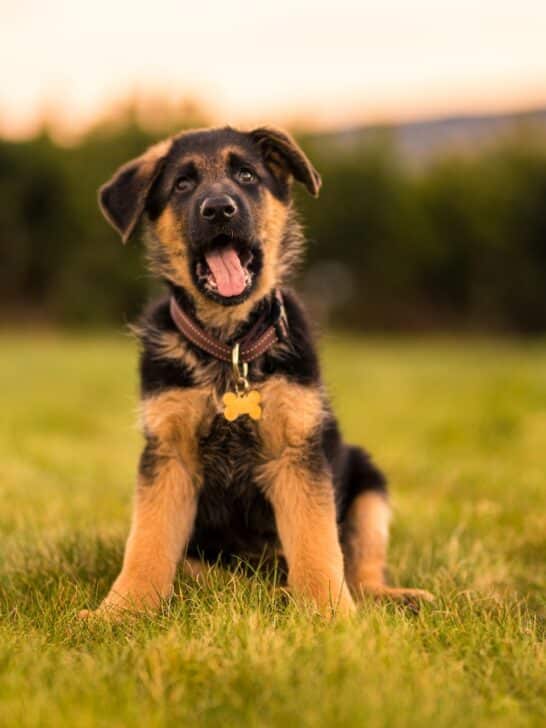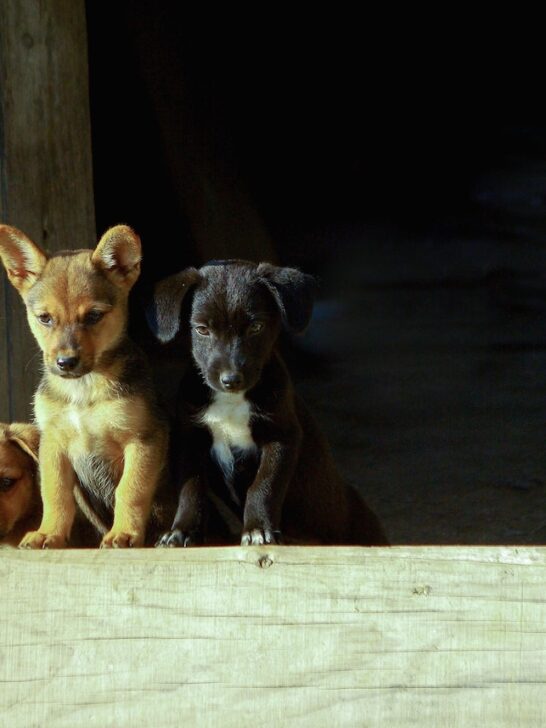German Shepherd Puppy Biting: The Best Ways To Stop This Nipping Behavior
Does your German Shepherd puppy seem aggressive for his age? Have you tried everything to reduce his play biting, but nothing seems to work? Do you sometimes wonder if he is even playing?
If you are desperately trying to figure out how to stop a German Shepherd puppy from biting, you are not alone.
The main way to stop GSD puppies from nipping is to understand why biting occurs, and why it is a normal part of canine development.
An important part of educating your GSD is avoiding physical and negative training methods, since this can be harmful to your relationship.
Positive reinforcement methods work best to teach your puppy to stop nipping, and to control the force of her bite.
This breed is notorious for nipping, and those sharp puppy teeth hurt! Let’s go over some ways to reduce GSD puppy biting, and give those scratch wounds some much needed time to heal.
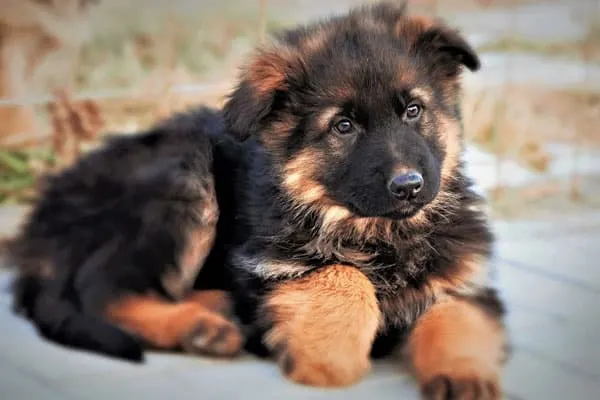
Why Do German Shepherd Puppies Bite So Much?
Most puppies go through several stages of nipping during their development. However, there are several reasons a German Shepherd might bite besides growth.
Pinpointing the reason your puppy bites you will help you figure out the most effective ways to curb unwanted behavior.
Puppies learn acceptable behavior by figuring out bite force
One of the major reasons puppies bite is to figure out acceptable forms of social behavior. They readily learn their bite force and how to inhibit it from their mother and littermates.
A leading cause of inappropriate and excessive nipping is removing a puppy from a litter too young.
Although some breeders release puppies to their new homes at six weeks of age, young dogs should be at least two months old before they leave their littermates.
Premature separation deprives puppies of crucial socialization skills they receive from their mother and siblings.
You may see similar increased biting frequency and force in a single puppy as you do in early withdrawal from a litter.
Solo pups do not have littermates from which to learn vital social skills, both in relating to other canids and with their human owners.
Puppies learn some skills from their mothers but often prove to have limited control over bite force.
According to Allivet, pups learn many acceptable socialization skills from both their dams and siblings between four and twelve weeks old.
Although many puppies are fully weaned by seven or eight weeks of age, their mothers continue to teach them about canine behavior, body language, and possibly how to interact with people.
Puppies learn how to interact with others through play with their littermates and direction from their dam. Siblings teach each other a lot about biting and unacceptable force.
The pup’s bond is still strong with their mother, though, reinforcing socially appropriate behaviors.
Your job becomes to teach your pup further to control bite force, creating a less dangerous dog down the line.
Herding instinct and prey drive can play a role in a pup’s nipping
People often excuse a pup’s biting as normal playfulness. However, a puppy playing may also be exhibiting prey drive.
Such pups will bite too hard, and the action becomes a stimulus for further aggression.
Have you corrected your puppy in the past for nipping only to have her bite you harder? When you think your pup is acting defiantly, she probably is simply becoming overstimulated.
You must treat an excited puppy differently than one who is displaying normal playfulness.
Herding breeds often have the instinct to nip more often than other classes of dogs. They are motivated by an enhanced prey drive as well as a desire to control other individuals.
Allow your GSD pup to become bored at your own risk.
Puppies will often nip you to get your attention. Young dogs will frequently nip each other to instigate a play session.
If your German Shepherd puppy is bored, he will quickly learn that he can get your attention by nipping or biting you.
Are you teaching your puppy to bite?
The way you interact with your pup may inadvertently teach her to bite. This video is a classic example of how many of us interact with puppies.
As this puppy gets older and more powerful, the biting will become more forceful and painful, and the pup is not likely to learn bite inhibition.
Children speak a foreign language to dogs.
Thelabradorsite.com talks specifically about Labrador Retrievers, but German Shepherd puppies and other breeds all have difficulty understanding the body language of children.
Adult dogs likewise can make errors reading kids, likely responsible for the fact that a large percentage of serious dog bites happen to children under the age of nine years.
Just as you supervise full-grown dogs with children to prevent injury, you should likewise monitor your puppy’s interaction with toddlers.
Because kids can be inconsistent, it becomes difficult for a pup to learn bite inhibition from them. Puppies tend to nip children with more force than they would adults.
How do you know if your puppy has a dominance problem?
Dominance aggression rarely shows up in puppies before the age of 18 to 24 months, which corresponds to social maturity.
Even German Shepherds, a breed known for problems with dominance, often suffer from a misdiagnosis because they can show aggression as early as six weeks old.
It is crucial to be able to identify and distinguish aggression in your puppy at an early age so you can eliminate dangerous behaviors.
What many people think is dominance aggression can be fear-based or anxiety-driven reactions to specific stimuli. Fear biting can be as damaging as canine dominance.
Distinguishing fear from dominance in your pup depends on several factors.
- Age – Aggression at a young age is usually fear-based.
- Body language – Fear usually starts as an attempt by a pup to make herself appear smaller. You will see a low body posture, dropped tail, and lowered ears. However, fearful dogs often learn to become more offense-oriented and eventually develop more assertive signals like erect neck hairs, upright ears, raised tail, and possible attacks.
Puppies and dogs who nip from dominance aggression should receive diagnosis and training from medical professionals and certified canine trainers.
- Guards possessions like toys or food
- Steal property and then guards it
- Fights leash or will not walk on a leash – During first introduction and training phase does not count
- Growls or threatens to attack when you do anything she does not like – Nail trim, lift, pet head, grooming. Note there is an important distinction between poor behavior and manners and dominance aggression.
Teething is not a primary reason puppies bite
Despite a common belief to the contrary, behaviorists do not attribute teething as a primary reason for biting or gnawing on your hand.
Puppies can experience sore gums and may bite intermittently as a result. Pups have their adult teeth by the time they are eight months old according to Purina.
How do you get your GSD puppy to stop biting?
Physical correction for biting is the least effective
You should never strike or verbally reprimand your puppy for biting.
As for yelping or squealing in imitation of how a littermate might react to a painful nip, the results are mixed.
Loud yelping sounds work on rare individuals and often serve to arouse GSD pups further. Excitement will intensify your dog’s biting.
Other tactics, such as grabbing your dog’s snout, pinching her muzzle, or tapping her on top of the head, will teach him to fear your hand or cause him to react aggressively towards it.
Other trainers teach people to stuff their hands deeper into their puppy’s mouth or insert their thumb under the animal’s tongue.
Again, making your dog uncomfortable with an activity that comes naturally to her will often stimulate fear or aggravate her aggression.
As reported by several sources, including Shibashake.com, physical correction can cause anxiety, fear, or stress in puppies and dogs.
Harsh punishment and even moderate physical or verbal reprimands too frequently lead to future aggression in dogs.
Diversion tactics deter your GSD puppy from biting.
You can stop your puppy from biting your hands by distracting him with a toy or game. Puzzles and similar games are especially effective if your pup is biting from boredom.
Training Methods
- Crate – You can avoid using your pup’s crate as a place of punishment or isolation by placing your pup inside it with a favorite toy. Keep the puppy and crate in the same room as you.
- Tether – Tethering is helpful if your puppy likes to bite your ankles or chases you when you attempt to ignore her. Similarly to the crate, do not use a rope to isolate your pup.
Games
Your training with games is most effective when you train the desired action with food rewards and then add the cue or command.
For example, you offer your dog a tasty morsel for dropping the ball after fetching it. Once your pup begins to bring the ball and give it to you automatically, you add a cue such as “drop it.”
You would use the same process with other games for the desired action, which is usually releasing the toy.
- Fetch – It may be difficult to get some pups’ attention with fetch, especially those who are extremely young. You must teach the game of fetch separately to be effective.
- Hand targeting – For some puppies, it is paramount to teach that the hand is non threatening. You can educate and use a cue word like yes or good to encourage your pup to touch your hand with his nose without nipping. Hold your hand palm up, but fingers pointed towards the ground and not your dog. When your puppy bumps your hand, reward with a treat. You can use a clicker instead of a cue.
- Tug of war – Excellent distractor from nipping, although some critics point out the game can encourage aggression and possessiveness in dogs. Proper tug-o-war involves only allowing your pup to pull for a few seconds and rewarding him for dropping it.
Toys
Toys are simple diverters. If your pup starts nipping, you substitute a toy for your hand. Toys are more effective for hand biters than ankle chasers.
- Chew bones, rawhides – You can give a bone to your pup before biting even starts to distract him before you initiate petting him. Preemptive distraction is especially good for children. You can also use a chew toy to distract your pet once he is already nipping you.
- Chew toys – Test different textures and toy types to find out which your pup likes best. You can even use treat dispensers or soft comfort-type stuffed animals as dogs often satisfy multiple needs with one toy.
- Rope toys
- Teething rings – Manufacturers often construct teething tools of soft and pliable plastic that proves soothing to the gums.
The most powerful deterrent to nipping is ignoring your puppy.
We are all familiar with the high abrasive screech a puppy makes when we accidentally cause her pain.
Some puppies even carry on a prolonged wailing if you step on a toe or tail.
But more compelling is the way a puppy abruptly withdraws, heading away from you or refusing any contact with you for at least several seconds.
Puppies in a litter who are too exuberant suffer the same social withdrawal from siblings and mother.
When a puppy nips at you, the most effective way to grab his attention is to withdraw yours. Many puppies do not listen to commands like “stop” or “no biting.”
Physical withdrawal of contact, play, or affection is a means to control something your puppy craves. Some behaviorists refer to this training method as managing a resource.
To work, you need to achieve physical separation immediately upon inappropriate or unwanted nipping from your puppy.
When the offensive act occurs, remove yourself by turning your back, placing your hands out of sight, or walking away.
If your pup is an ankle biter, as herding dogs can be, put a baby gate that you can step over and effectively insert between you and your pup.
Ignoring your puppy for a few seconds can be particularly useful for pets who bite mainly to get your attention in the first place.
Physical withdrawal does not equate to social isolation. Simply turn away for seven to ten seconds and then attempt to engage your pup again, perhaps in a different activity.
Each correction is an opportunity to provide some form of training for your puppy.














